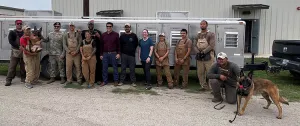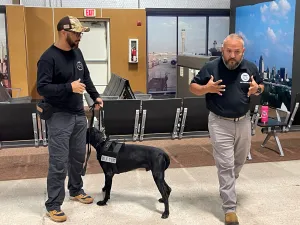 DGAC Chilean delegation with TSA Canine Training Center personnel. (TSA CTC photo)
DGAC Chilean delegation with TSA Canine Training Center personnel. (TSA CTC photo)
Dogs are helping TSA make new friends and partners around the world.
A delegation from the Republic of Chile in western South America flew to San Antonio, Texas, to get an up close look at TSA’s Canine Training Center (CTC) and learn a thing or two about how TSA uses canines to protect the traveling public as well as understand many of the ins and outs of aviation security in the U.S.
They represented Chile’s Directorate General of Civil Aeronautics (DGAC), which is committed to enhancing their country’s aviation security.
“The visit highlighted the critical role trained dogs play in ensuring aviation safety by detecting substances posing threats, such as explosive devices,” said Canine Training Instructor Dan Whidby. “The involvement of canines is part of a broader strategy to use advanced detection technologies and skilled personnel to secure airport environments, ensuring potential threats are identified and mitigated effectively before they impact passenger safety.”
During the visit, the TSA CTC team exposed the Chilean delegation to all facets of the agency’s canine program, presented mission briefings and canine demonstrations and guided them on a full tour of the Canine Training Center.
TSA’s Department of Defense partners, the 341st Training Squadron and Military Working Dog Veterinary Service served up detection and apprehension demonstrations and a tour of the Holland Working Dog Veterinary Hospital, a one-of-a-kind $15 million facility dedicated solely to the care of more than 800 canines in training.
“Much like TSA does for the U.S., DGAC plays a pivotal role in passenger safety through stringent regulatory oversight and comprehensive security protocols across all Chilean airports,” Whidby explained. “The DGAC’s mandate also includes continuous monitoring and assessment of safety procedures, emergency response preparedness, and the regular training of airport security staff. Their rigorous approach helps maintain a safe flying environment for millions of passengers annually, minimizing risks and enhancing the overall security of air travel in Chile.”
In an effort to align with global airport security standards, Chile is actively working toward implementing TSA-level screening standards.
“This initiative involves upgrading existing security technologies and enhancing personnel training to meet our nation’s stringent requirements,” Whidby said. “These efforts reflect Chile’s commitment to maintaining and elevating the safety and efficiency of its air transportation systems in line with worldwide expectations.”
By Don Wagner, TSA Strategic Communications & Public Affairs


